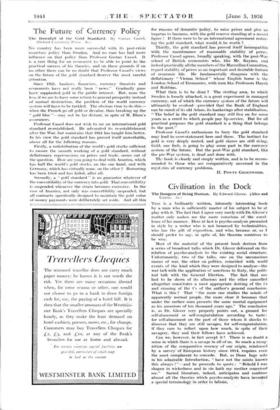The Future of Currency Policy
No country has been more successful with its post-crisis monetary policy than Sweden. And no man has had more influence on that policy than Professor Gustav Cassel. It is a..rare thing for an economist to be able to point.to the practical success of his theories, and on..these grounds if on no other there can be no doubt that Professor Cassels views on the future of the gold standard deserve -the most careful attention.
Since 1931, bankers, financiers, currency theorists and economists have not really been "news.' Gradually guns have supplanted gold in the public interest. But, none the less,,if we are to have some return to general prosperity instead of mutual destruction, the problem of the world currency system will have to be tackled. The obvious time to do this— when the French go off gold or devalue, thus breaking up the "gold bloc "may not be far distant, in spite of M. Blum's assurances., . • . - ProfessOr •Cassel does not -wish to see an international gold standard re-established, He advocated its re-establishment after the War, but maintains that 1931 has taught him better. In his view the gold standard -has proved itself unworkable, above all for the following reasons. Firstly, a redistribution 'of-the world's gold stocks sufficient to ensure the smooth working of a gold standard, without deflationary repercussions on prices and trade, seems out of the question. How are you going to deal with America, which has half the world's gold stocks, on the one hand, and with Germany, which has virtually none, on the other? Borrowing has been tried and has failed, after all. Secondly, a "gold -standard" is no guarantee whatever of the convertibility of the currency into gold. That convertibility is suspended whenever the strain becomes excessive. In the ease of America, not only was convertibility suspended, but all contracts specifically designed to maintain the gold value of money payments were deliberately set aside. And all this for reasons of -domettic -policy, to raise prices and give an impetus to business, with the gold reserve standing at a record figure ! If there were to be an international agreement restor- ing the gold standard, what would_it.be worth ?, . Thirdly, the gold. standard _has proved iteelf incompatible with the maintenance or reasonable stability of prices. Professor Cassel agrees, broadly speaking, with the post-War school of British economists who, like Mr. Keynes, and indeed practically all the members of the Macmillan Conunittee, regard stability of prices as an important and desirable feature of economic life. He fundamentally disagrees with the deflationary "Vienna School" whose English home is the London School of Economies, with men like Professors Hayek and Robbins.
What then is to be .dozie ? • The sterling area, to which Sweden is loosely attached, is a great experiment in managed currency, out of which the currency system of the future will ultimately be evolved—provided that the Bank of England can be cured of its old Adam, its hankerings after stabilisation: "The belief in the gold standard may still live on for some years • as a creed to which people pay lip-service. But for all practical purposes the gold standard is a thing that belongs to the past." Professor Camel's enthusiasm to bury the gold standard may lead to over-statement here and there. The instinct for gold is very deeply rooted, and gold shares are still rising. Gold, one feels, is going to play some part in the currency system of the future. But the post-War gold standard, like the pie-War system, is dead and done with.
• Th book is clearly and simply written, and is to be recom- mended to those who are comparatively unversed in the mysteries of currency problems.
H. POWYS GREENWOOD.














































 Previous page
Previous page